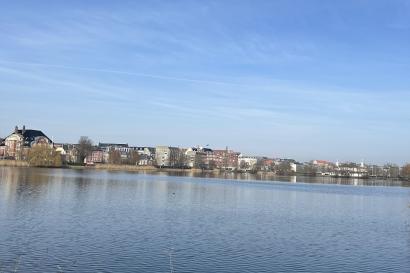Unlike most semesters, this spring I focused my studies on music. Being a double major, I normally split my attention between music and English, which allows me to learn about my two favorite things at once, but not as intensely as focusing on only one subject. So, this semester in Vienna was my chance to dive deep into classical music, and I ended up deeper into the subject that I thought I could go. In fact, I don't think I will ever think of music in the same way again.
Generally speaking, the music field is kind of a triangle--one side is theory/composition, another side is history, and the third side is performance. A thorough knowledge of all three makes a typical modern-day musician, or at least a music student. IES Vienna's music program offers a large selection of classes in all areas of music; having already completed my home school's theory requirement, and being unable to enroll in the performance workshop due to my internship, I decided to focus on the history side of my musical triangle. Aside from playing piano, history is my favorite part of the music curriculum. I love learning about the "why's" of music, like a composer's inspiration, or how societal context influences a piece. Shostakovich, for example, not-so-subtly undermined Stalin's regime in his symphonies, and Mozart was a fan of writing--and never explaining--harmonic jokes in his music. My knowledge of music history in that respect has grown tenfold, but so did something entirely new to me: historical performance practice.
It might seem obvious that music, musicians, and musical intsruments have changed over time. Much of the music we listen to and study now didn't exist a few hundred years ago, just as the instruments we play today were not constructed the same way in the past. As a matter of fact, performance style itself has changed over the years, so much so that there are different ways to play the same piece. But, for many musicians and students, none of that matters too much when we are expected to play modern instruments in a modern style in order to get auditions and make careers.
It all started when I registered for a class called, simply, "Historical Performance Practice." It was a new offering at IES Vienna, and it sounded like no other music course I had heard of before. On the first day, we discussed the relationships between composers, performers, and listeners (essentially, composers are considered geniuses, performers must obey their commands, and listeners sit and listen), which previously seemed so natural that I had never even thought to examine them. Then, a few days later, a real 1820s fortepiano was rolled in. And I've been playing it. Just like actual Viennese people in the 1820s. You might have noticed that this excites me a great deal.
I realize this blog entry is a lot of rambling about musical ideas that might be confusing for some, for which I apologize, but it seemed approriate to write about one of the best learning experiences I had during this semester. I could spend many hours recounting the specifics of historical performance practice that rocked my musical world, but I will state all of it briefly. Essentially, what I learned is that nothing we do in music today is the way it has always been--performers did not always adhere strictly to a score, nor did they shy away from improvisation or creative interpretation. It seems now that there are so many paths my musical life can take, and that I can look to the past to try out new things in order to create a playing style that feels the most authentically "me." In other words, I feel like I can start thinking for myself when it comes to my music, something I'm not sure many people can say.
Although I'm not planning on a career in music (except maybe teaching piano lessons), I realized this semester that music is something I can never stop discovering. There is so much information readily available, and I am now more equipped than ever to access it and learn from it. I didn't think my time in Vienna would change how I approach music and performance, but it has--and for the better, I think.

Kelsie Seehusen
<p>Kelsie is a junior at Skidmore College, double majoring English and music. Her academic interests include creative nonfiction, piano performance, German language, and feminist theory. When she isn't in class or at the library, Kelsie spends her time playing piano, writing personal essays, knitting, or just curling up with a good book and a few cats. While studying in Vienna, Kelsie hopes to improve her German and piano skills, as well as immerse herself in Viennese culture.</p>







